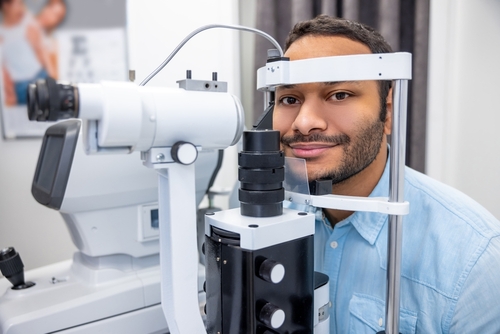Walk-Ins and Same Day Appointments Available

The eyes are among the most sensitive body organs, which is crucial when you need to navigate the world and communicate effectively. While they are sensitive, they behave stealthily—many eye conditions do not present symptoms until they are in advanced stages.
This paradox stems from how the brain adjusts to your changing vision due to eye conditions. Because of this paradox, comprehensive eye exams are the only way to ensure that your vision and eye health are intact.
What Is a Comprehensive Eye Exam?
A comprehensive eye exam is a series of eye tests that an eye doctor performs to look at different aspects of eye health. It differs from a vision screening because it checks more components of eye health through more complex tests. The tests are essential to identifying any conditions hiding under a clear vision. Some of the major tests in a comprehensive eye exam include the following:
Eye Focusing, Teaming, and Movement Test
This group of tests measures specific visual abilities of the eyes necessary for clear and consistent vision. To see a clear image when you look at something, your eyes must focus and move in unison at the same time.
If they do not, you may develop double vision, and the incongruence could lead to symptoms like headaches and eyestrain. These tests help the eye doctor ascertain that your eyes are working together and that nothing impedes their ability to work together.
Eye Health Evaluation
In this series of tests, the eye doctor will use different devices and equipment to examine the health of different eye structures within and surrounding the eye. To analyze the interior structures of the eye, the eye doctor may use dilating eye drops to widen the pupil.
One critical test requiring a widened pupil is the eye pressure test, which checks for glaucoma. Additionally, the inner structures of the eye can show symptoms of many eye conditions that develop unnoticed.
What Conditions Can a Comprehensive Eye Exam Detect?
Some common eye conditions that an eye doctor can detect with a comprehensive eye exam are glaucoma, macular degeneration, diabetic retinopathy, and developing cataracts. Moreover, an eye doctor can detect other body conditions that affect eye health, usually systemic diseases.
Some common ones are:
Hypertension, or high blood pressure
Diabetes
Some cancers
Autoimmune conditions
How Can a Comprehensive Eye Exam Help Manage Eye Conditions?
Once an eye doctor detects that you have an eye condition, they prescribe a treatment plan. But eye conditions are not curable, so the eye doctor will need to monitor them. The eye doctor will identify, through subsequent exams, the progress and effectiveness of your treatment plan. If the condition progresses, they must adjust your treatment to slow it and preserve your vision.
For more on the importance of comprehensive eye exams in detecting and managing eye diseases, visit Market Street Optometry at our office in San Francisco or Daly City, California. Call (415) 896-1824 or (650) 992-0102 to book an appointment today.










